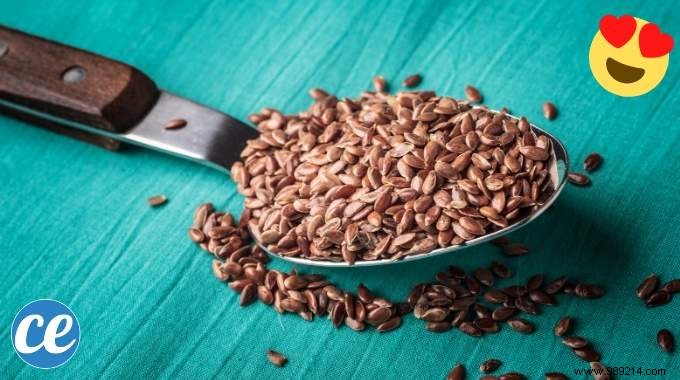
Flaxseeds have been consumed for over 6,000 years and remain one of the world's most cultivated superfoods. Packed with anti-inflammatory omega-3 fatty acids and lignans—powerful antioxidants that support hormonal balance—they offer proven nutritional advantages.

Research consistently highlights flaxseeds' role in supporting digestion, heart health, cholesterol reduction, and hormonal balance. Here are 12 key health benefits of flaxseeds, supported by scientific evidence.
Flaxseeds are rich in mucilaginous gum, a soluble gelling fiber that slows digestion. This allows better nutrient absorption and promotes satiety without adding digestible calories.
Low in carbs but high in both soluble and insoluble fiber, flaxseeds aid colon detoxification, support fat loss, and curb sugar cravings. Aim for 25-40 grams of fiber daily; just 2 tablespoons of flaxseeds provide 20-25% of that goal.
Fish oil's EPA and DHA are well-known, but flaxseeds deliver alpha-linolenic acid (ALA), a plant-based omega-3 with comparable benefits. Studies show ALA reduces coronary heart disease risk, hypertension, inflammation, and arrhythmias while supporting endothelial function and platelet health.
ALA and B vitamins in flaxseeds strengthen hair, making it shinier and more resilient, while combating skin issues like dryness, acne, rosacea, and eczema. They also alleviate dry eyes.
For optimal results, incorporate 2 tablespoons of ground flaxseeds into smoothies or 1-2 tablespoons of flaxseed oil daily. Use the oil topically as a moisturizer, blending with essential oils for deeper penetration.
Soluble fiber in flaxseeds binds fats and cholesterol in the gut, promoting their excretion. It also traps bile acids, forcing the body to use excess blood cholesterol to produce more, effectively lowering levels.
Hyperlipidemia—a key heart disease risk factor—is significantly reduced by whole flaxseeds (not oil), as confirmed by clinical studies.
Flaxseeds serve as an excellent gluten-free alternative to grains, with anti-inflammatory properties and superior digestibility. They absorb liquids and bind ingredients, ideal for gluten-free baking like breads and pastries—especially for those with celiac disease or intolerance.
Pair with coconut flour for optimal texture in recipes, replacing animal fats effectively.
Flaxseeds stabilize blood sugar, benefiting diabetics. In one study, 1 tablespoon daily for a month lowered fasting blood sugar, triglycerides, and cholesterol. Over 12 weeks, they improved insulin sensitivity in those with glucose intolerance.

Lignans—polyphenols unique to flaxseeds—combat free radicals, offering anti-aging, hormonal balancing, and regenerative effects. These phytoestrogens modulate estrogen activity, potentially slowing tumor growth in postmenopausal women.
Lignans also provide antiviral, antibacterial benefits, supporting gut probiotics and reducing infections like colds or candida. A nutrient-dense diet maximizes their impact.
A Canadian study deemed flaxseed one of the most potent dietary interventions for hypertension. Daily intake reduced systolic and diastolic pressure within 12 weeks. Opt for ground flaxseeds over oil or lignan extracts for best results.
ALA reduces gut inflammation, while high fiber (soluble and insoluble) nourishes beneficial bacteria, eases constipation, and ensures regular bowel movements. Magnesium relaxes digestive muscles and softens stool.
Beneficial for Crohn's and everyday digestion; try ground flaxseeds or 1-3 tablespoons of oil in carrot juice.
Lignans and fiber in flaxseeds may lower risks of breast, prostate, ovarian, and colon cancers by balancing hormones and inhibiting tumor growth. They're central to the Budwig protocol—a flax oil-based cancer prevention diet.
Studies link higher intake to reduced breast cancer risk, especially in vegetarian diets rich in these compounds.
Fiber and healthy fats create lasting fullness, preventing overeating and hormonal weight gain. Add ground flaxseeds to soups, salads, or smoothies for effortless integration.
Lignans mimic estrogen, easing hot flashes, supporting bone health, and regulating cycles. Consume 1-2 tablespoons of ground flaxseeds in breakfast smoothies plus oil daily as a natural hormone therapy alternative.

These small brown or golden seeds are nutrient powerhouses: rich in fiber, manganese, thiamin, magnesium, plant protein, ALA omega-3s, and lignans (7x more than sesame).
Ground or sprouted forms maximize absorption; whole seeds pass undigested. Flax oil provides concentrated fats.
Both excel in fiber and ALA, but flaxseeds offer more ALA and lignans; chia has more calcium and can be eaten whole. Refrigerate flax to prevent rancidity.
Available in organic stores (bulk or packets) or online.
Keep whole or ground in opaque containers in the fridge/freezer. Coarsely ground lasts 10 months at room temperature.
Yes, bake at 150°C for up to 3 hours without degrading omega-3s.
- 1-3 tbsp ground flax in smoothies with water or plant milk.
- Mix with yogurt and honey.
- Bake into muffins, cookies, bread, or granola.
- Use as egg replacer (mixed with water) in vegan recipes.